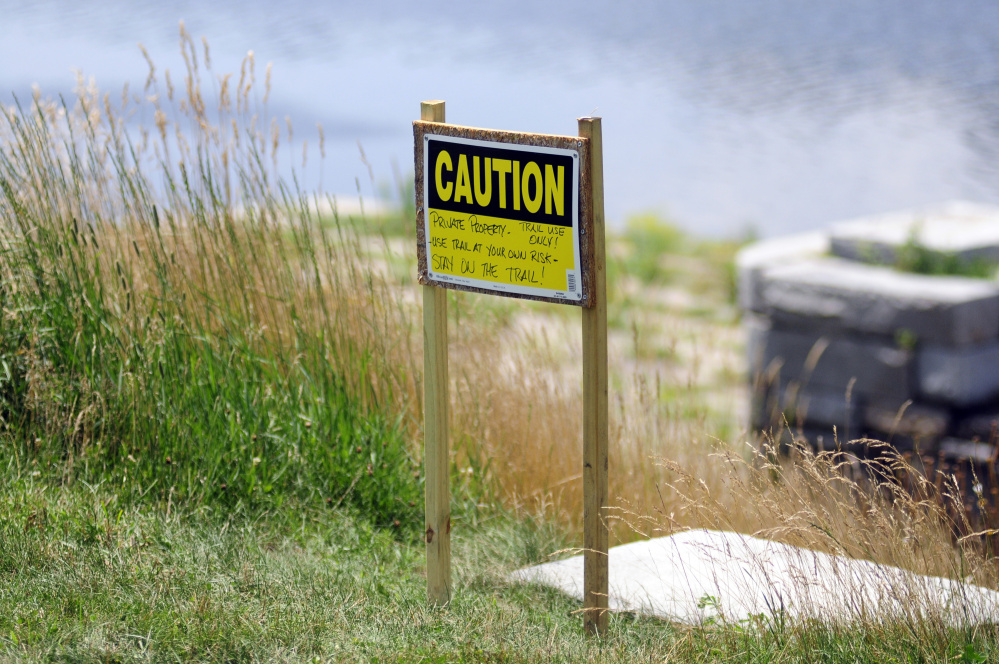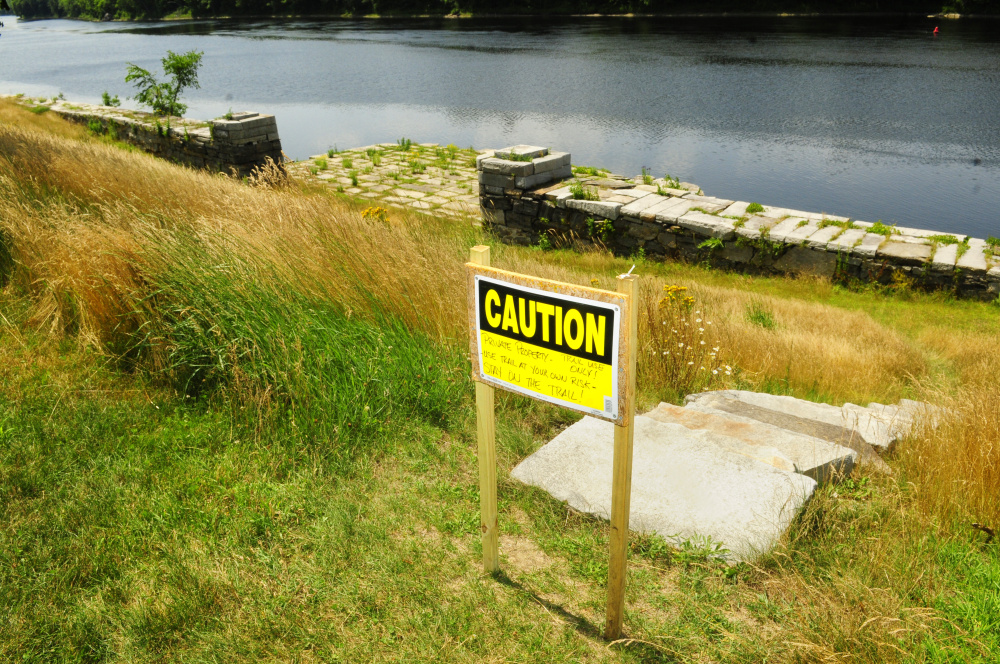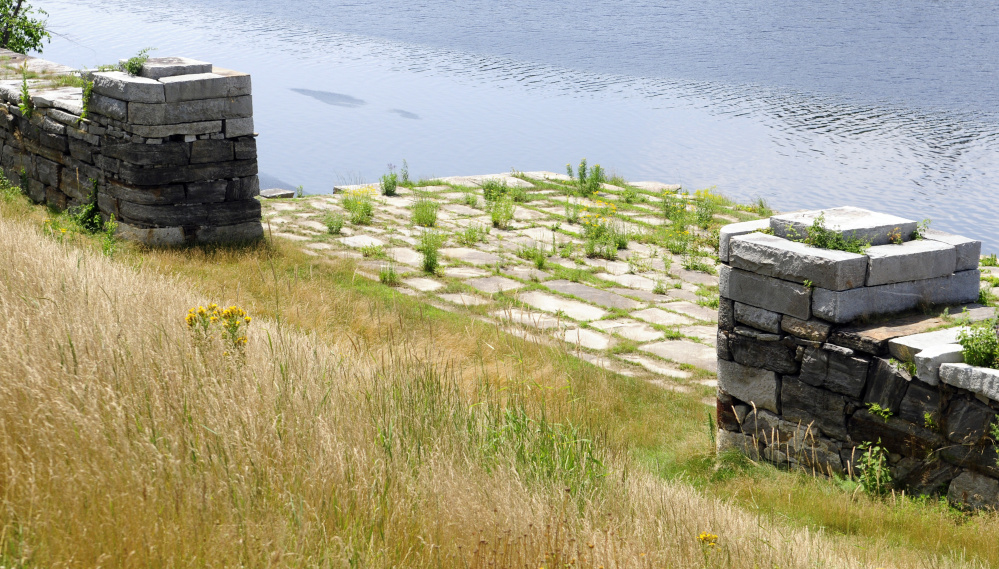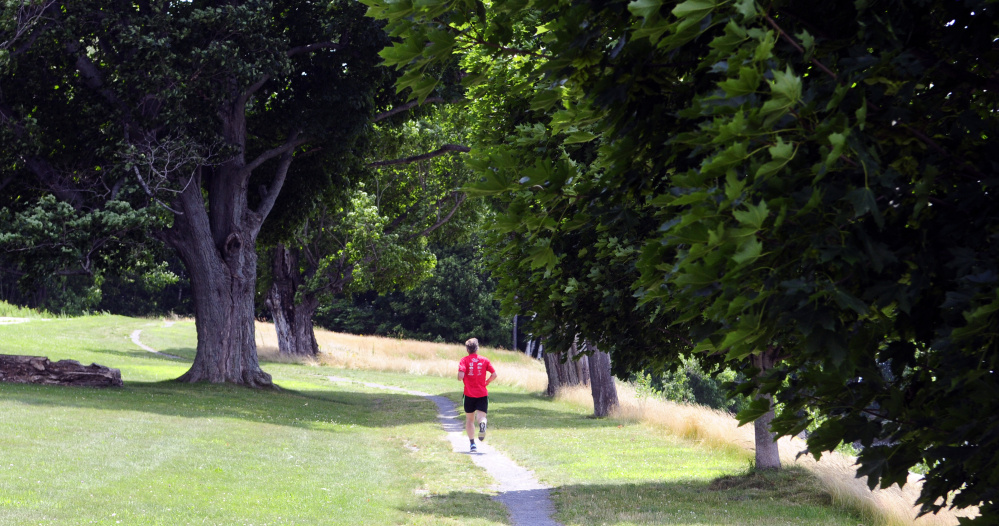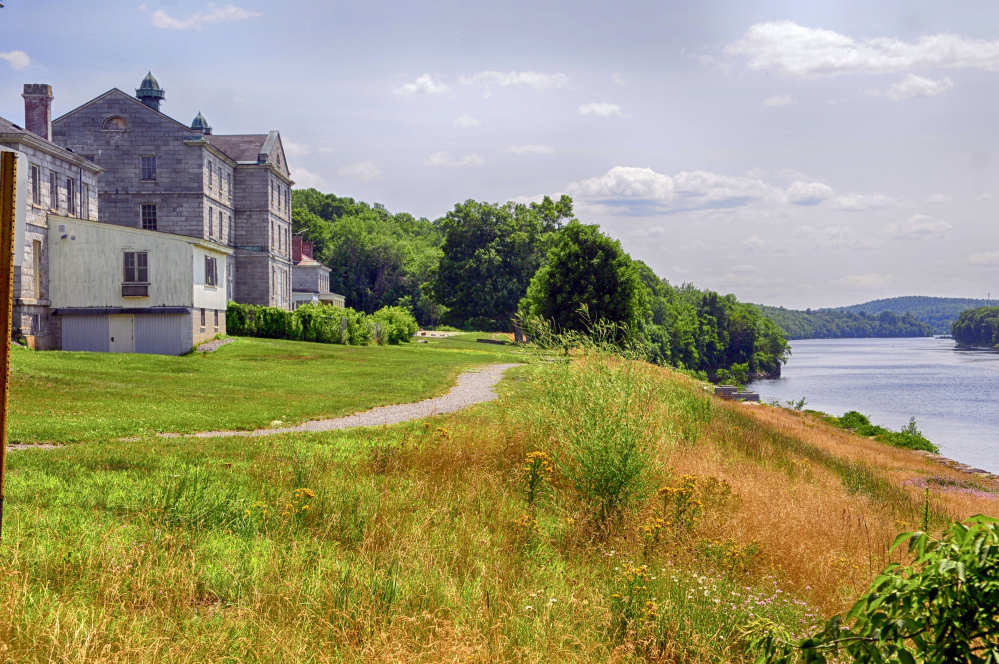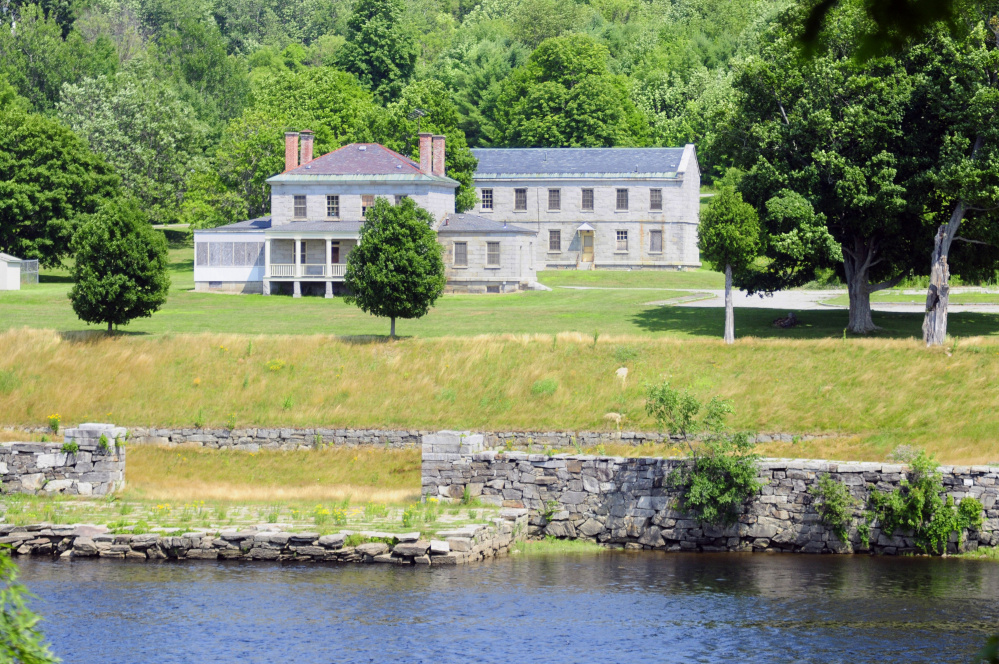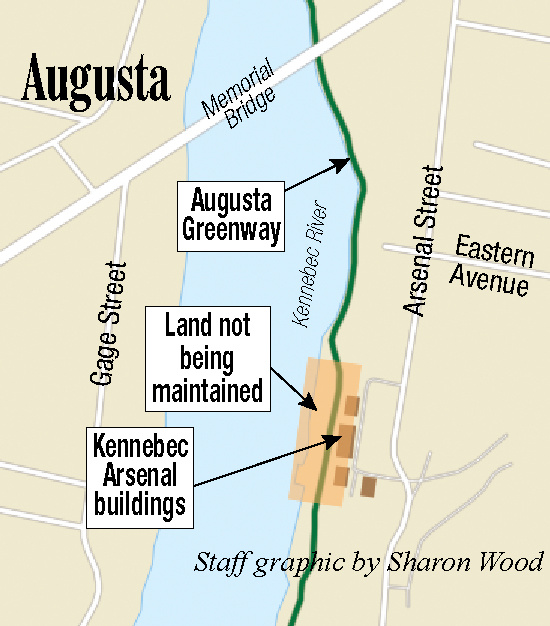AUGUSTA — A prominent riverfront granite wharf and parcel of land between the historic Arsenal property and the Kennebec River has been allowed to grow back in with tall grass, weeds and a few small trees, prompting the city manager to raise concerns about a highly visible part of the city.
The 1,000-foot-long, 17-foot-high, rock retaining wall was reclaimed from overgrowth that all but hid it from view in 2005 as part of a nearly $600,000 project.
Mowing the piece of land visible from Memorial Bridge high above it is not the responsibility of oft-criticized Arsenal owner and would-be developer Tom Niemann. Rather, it is the responsibility of the state under the terms of a 2007 “use agreement” with Niemann that specifies the state “shall maintain the Wharf Parcel in good order and repair and in a reasonably neat and clean condition, including periodic mowing and removal of brush as necessary.”
A spokesman for the state Department of Administrative and Financial Services acknowledges periodic mowing of the property is the state’s responsibility, but said the state hasn’t been able to get the property mowed since last summer when the only contractor to bid on the job doubled his price because of concerns about being able to mow the steeply banked property safely.
David Heidrich Jr., director of communications with the state Department of Administrative and Financial Services, said the state is looking at options and will find a way to get the parcel mowed as required by its agreement with Niemann.
“Ultimately we’ll be addressing the issue and trying to find a solution that’ll get the wharf parcel maintained as it needs to be,” Heidrich said. “We’re not sure what our solution will be, but one way or another, we’ll get the grass down.”
Augusta City Manager William Bridgeo said he is concerned the property isn’t being mowed, especially given its visibility in the city.
That part of the Arsenal property, including the now more than 180-year-old squarish granite wharf and riverfront granite retaining wall, was restored and reclaimed from an overgrowth of trees, shrubs, weeds and other vegetation in 2005. Previously, it was so overgrown the wharf was all but invisible.
The $590,000 project was funded by a $295,000 Save America’s Treasures grant from the National Park Service and National Trust for Historic Preservation, $200,000 from the state and $95,000 from the Capital Riverfront Improvement District, a now inactive state and city partnership.
The project included removing trees and shrubs to open up views of and from the property and the filling of sinkholes and other erosion that had developed next to the retaining wall.
“That cleaned up the whole front of the property and opened it back up. That’s when people rediscovered the majesty of the Arsenal property,” Bridgeo said.
Heidrich said that because of the safety issues of mowing the steep banking, only one contractor submitted a bid to do the work, the same contractor who mowed it previously whose identity Heidrich said he didn’t know. That contractor’s proposal was double the previous cost. Neither the previous nor most recently proposed costs of mowing the site were available from state officials Friday.
Heidrich said it was high enough that the state is now looking for other ways to mow the property.
“In our opinion, it was too much of a price jump to double it,” Heidrich said.
He said other options could include putting the work out to bid again, or having state employees do the work of either mowing or weed-whacking the site to keep the grass at a reasonable height.
He said the department looked into burning the grass off in a controlled burn or replacing the grass and weeds growing there with rocks and doing some hardscaping, but state Department of Environmental Protection officials said those methods couldn’t be used because they wouldn’t do an effective enough job retaining stormwater at the site.
DEVELOPMENT SITE
Meanwhile a lawsuit filed by the state in 2013 claiming Niemann had failed to maintain and protect the Arsenal’s eight historic granite buildings built between 1828 and 1838 remains on hold under an agreement between the state and Niemann which has allowed him to take steps in recent years to secure the property from vandals and weather damage.
“In the past two years, Mr. Niemann has made much progress in making the Arsenal buildings weather-tight and secure, but there is additional work that must be done,” Tim Feeley, special assistant in the Maine Office of the Attorney General, said in an email. “The parties are attempting to reach an agreement on the scope and time frame for this additional work, and we are optimistic that we will soon reach an agreement. If an agreement cannot be reached, the parties may need to involve the court in order to resolve their differences.”
Niemann bought the property from the state in 2007 for $280,000. Attached to the sale are requirements that the buildings be preserved and their historic character maintained. At the time Niemann said he would redevelop the property for mixed uses, including condominiums, a restaurant, offices and retail. None of that redevelopment has occurred and the property remains vacant.
The state, in a court complaint filed in April 2013, alleged Niemann’s company, Niemann Capital and Main Street LLC, had neglected the property since taking ownership of the site, allowing it to be damaged by vandals and allowing historic architectural features to deteriorate. The state lawsuit sought damages and assurances Niemann would protect the property and also noted, if that is not done, it could seek to reclaim the property.
Niemann denied those allegation in court filings. He has said an economic collapse occurred just after he closed on the property, making financing hard to come by and preventing the redevelopment of the property.
Both sides have since met and, as Feeley indicated, agreed to keep the lawsuit on hold as long as they continue to agree on what Niemann needs to do to keep the property secured and protected from deterioration.
A joint status report filed in Kennebec County Superior Court this May indicated both sides were working collaboratively to reach an agreement on what needs to be done to protect the property, and it would be premature to place the case on a list of cases to be brought to trial.
Niemann said by email he continues to cooperate with the state. He said he plans to meet with state officials to discuss maintenance of the property after Aug. 20.
PUBLIC ACCESS
Niemann said his firm, North Carolina-based Niemann Capital, remains committed to both the city and state to redevelop the property over time. He said “2010 was a very difficult year” for his company and the site.
He said Friday he hopes to announce a first tenant for the property in the fall, as negotiations are taking place with a Maine company he declined to name to occupy all of the Burleigh building, the largest of the buildings, and possibly some or all of one of the other buildings which are listed as National Historic Landmarks.
“There has been more interest expressed in the site from others over the last six months than the last six years,” Niemann said. “This is a very good sign, and it points towards the strong leadership in the city, the improving real estate market in the area and the intrinsic value of the Arsenal campus.”
Since 2013 Niemann said roofs of buildings there have been replaced, a security worker has been hired to watch over the property, and other work including landscaping, painting and foundation, drainage and masonry projects have taken place.
Last month Niemann closed off public access to the grounds of the property, citing concerns about illegal activity in and around the parking lot.
Augusta Deputy Police Chief Jared Mills confirmed that before the site was closed off, police had responded to reports of indecent conduct and drug dealing on the property.
The Greenway Trail, a hiking and biking trail that runs between the Arsenal buildings and the river above the currently unmowed wharf area, remains open to the public via an easement the city holds ensuring public access to it.
Niemann reiterated Friday that he plans to reopen the Arsenal grounds to public access, likely for limited hours, in August after forming a plan to do so.
Keith Edwards — 621-5647
Twitter: @kedwardskj
Send questions/comments to the editors.


